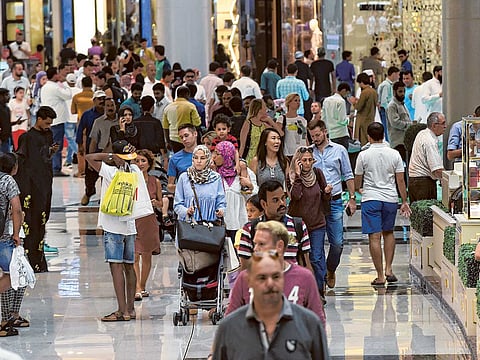More than 1 million people drive down to Dubai for work
High rents and education fees force employees to seek residence in other emirates, researchers say

Dubai: Over one million UAE residents work in Dubai but choose to live in one of the other emirates, showed the latest numbers by the Dubai Statistic Centre (DSC).
The number of people working in Dubai and residing in other emirates has grown by three per cent from 2013 to 2015.
The permanent resident population of Dubai was reported at 2.4 million in 2015, with an additional 1.1 million people driving down to Dubai for work during peak hours from Saturday to Thursday (6.30am to 8.30pm), making Dubai’s population 3.5 million during daytime, the report showed.
This number mainly includes employees at the federal and local government departments, the private sector, as well as temporary residents like tourists and sailors.
While Dubai is considered a key trading hub due its location, it is also known to be one of the most expensive cities to live in, said Ahmad Bakr, research analyst at Euro Monitor.
“The government has been able to encourage international businesses to operate in the city through increasing the presence of free zone areas, which facilitated the ease of doing business. Dubai alone has around 50 per cent of all free zones in the UAE,” he explained.
Dubai is also home to the largest business marine terminal in the Middle East, Jabel Ali port, and offers a variety of jobs across industries, attracting potential employees in the region.
“Administration executives, sales representatives, and accountants will continue to drive demand in the job market in Dubai,” explained Bakr. He pointed out that mid-level professionals will continue to see Dubai as an attractive city to come and work in, with many professionals coming from neighbouring Middle Eastern countries and European countries.
Standard of living
However, the question remains; what makes over one million people working in one of the most appealing cities in the world reside in neighbouring emirates?
Bakr put out it down to two factors — high rents and increasing education fees in Dubai.
“The cost of living in the city is relatively higher than other emirates, especially Northern Emirates. Even though rent prices have marginally reduced this year, they have risen significantly over the last five years, pushing a lot of people to move further away from the Dubai seeking lower rents,” he explained.
Education fees in nurseries, primary and secondary schools are also on a constant climb, with more schools gaining approval for a fee hike this year. It was previously reported this year that private schools in Dubai can increase their fees for the 2016-17 academic year by a minimum of 3.21 per cent and up to a maximum of 6.42 per cent, depending on their ratings following annual school inspections.
The Knowledge and Human Development Authority (KHDA) also announced that this increase is based on the new Education Cost Index (ECI), which has risen from 2.92 per cent last year to 3.21 per cent.
“Education fees in Dubai continued to increase, keeping an extra pressure on expatriates, especially those who have families. This is encouraging them to move to other emirates like Sharjah and Ajman, where they enjoy an overall lower cost of living,” said Bakr.
Another important factor pushing a large number of people to live in other emirates is their proximity to Dubai, with the only hindrance being traffic snarls during rush hours.
Statistics provided by Euro Monitor showed that the total number of domestic business trips in the UAE reached close to 390,000 in 2015. The research company defines ‘domestic business trips’ as the number of trips taken by residents of the country within their country of residence (day trips are excluded), said Amna Abbas, research analyst at Euro Monitor.
Looking at the increase in the cost of living in the last five years, the number of people living outside of Dubai and working in Dubai has been growing and is predicted to continue to rise, she highlighted. “This trend will continue, as the population grows organically. Over the forecast period, Dubai will remain one of the most expensive emirates, which will encourage employees to move to other emirates like Sharjah and Ajman,” added Abbas.



